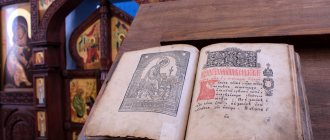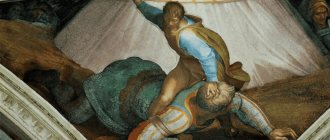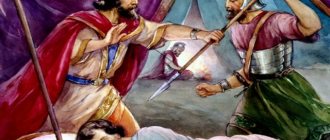Text of prayer Psalm 120
In Orthodox worship, the text of Psalm 120 is read in Church Slavonic. At home, many righteous people use the text of the prayer Psalm 120 in Russian.
In Church Slavonic with accents
Song of degrees.
1 I have lifted up my eyes to the mountains, from there my help will come.
2 My help comes from the Lord, who made heaven and earth.
3 Do not let your feet fall into confusion; He who guards you will slumber below,
4 Behold, he will not sleep; the guardian of Israel will sleep.
5 The Lord will protect you, the Lord will cover your hand on your right hand.
6 During the days the sun will not burn you; the moon will not burn you at night.
7 The Lord will keep you from all evil; the Lord will preserve your soul.
8 The Lord will preserve your coming in and your going out from now on and forever.
In Russian
Song of Ascension.
1 I lift up my eyes to the mountains, from whence my help will come.
2 My help comes from the Lord, who created heaven and earth.
3 He will not let your foot slip; He who guards you will not slumber;
4 He who guards Israel neither slumbers nor sleeps.
5 The Lord is your keeper; The Lord is your shadow at your right hand.
6 The sun will not strike you by day, nor the moon by night.
7 The Lord will keep you from all evil; The Lord will preserve your soul.
8 The Lord will guard your going out and your coming in from now on and forever.
Reading rules
It is recommended to read the Psalter throughout your life, it is advisable to obtain the blessing of a priest for this.
Basic Rules:
- Language. An ordinary person can read the text in Russian, although during services it is spoken in Church Slavonic.
- Interrupting the process. If there is a need to stop while reading, then later you should return to the text from the same place. But if possible, it is better to try not to be distracted.
- Volume and rhythm - it is better to read in a low voice or quieter, a little into a sing-song voice.
The psalm is part of kathisma 18. The reading of kathismas is preceded and concluded by special prayers, the texts of which are published in some editions of the Psalter. The following prayers are usually read: “Come, let us worship...”, “Trisagion”, Alleluia three times, “Lord, have mercy”, Glory, about the remembrance of the living and the dead.
History of writing
There is no specific date for writing the prayer. It has its own name “Song of Ascension”. Some of the psalms also bear a similar name. All these songs carry similar lyrics and the main idea - praising the Lord. It is believed that the prayer was written during the difficult times of the captivity of the Jewish people by the Babylonians. In some scriptures this song is called the "Warrior Song".
Some commentators claim that the text was written at a time when David was fighting his enemies. Wars were commonplace back then.
Why do they read?
Researchers suggest that this psalm was composed by Jews on the way from Babylon to Israel.
Saint Athanasius writes: this “
the song is sung by the people, although freed from captivity, but still returning only to their fatherland and making a long journey from Babylon to Jerusalem, why, caught in the mountains, they beg for help.”
.
Therefore, pious Christians read this psalm:
- in various difficult life circumstances;
- to strengthen faith in the promises of God;
- into the divine intercession and help of the Almighty.
Interpretation of Psalm 120
The interpretation of the text begins precisely with the story of the ascent of former captives to the Jerusalem mountain.
Verses 1-2: Comfort can only be found in the Lord. Even in difficult moments you need to find the strength to fight. You need to rely only on yourself and your faith. Trust in God is the main idea of the lines.
Verses 3-4: God controls everything that happens on earth. The Almighty does not sleep. He is ready to help everyone who truly believes and honors him.
Verses 5-6: The author introduces the characteristics of the Creator. A person can cope with all difficulties through faith in the Lord. After all, it makes the difficult fate of the common man easier.
Verses 7-8: The Lord is always near. He will not allow himself to leave his people in trouble.
The meaning of the inscription of psalms[ | ]
Psalm 90. bible. text, audio, when to read psalm 90
The exact meaning of the inscription “song of ascension” has not been established (like many other inscriptions in the psalms). There are several versions. In the Jewish tradition, the accepted explanation is that these psalms were sung by the Levites during services in the Jerusalem Temple, standing on the steps that separated the women's courtyard of the temple ( ezrat nashim
) from the inner part of the temple courtyard, where only men were allowed. There were fifteen of these steps - hence the number of corresponding psalms. In accordance with this explanation, in the religious texts of Judaism, when translated into Russian, the inscription of the psalms is usually rendered as the “song of steps” (the word “maalot” (מעלות) in Hebrew has the meaning of both “steps” and “ascent”).
According to Christian tradition, the inscription speaks of the ascent to their homeland, Jerusalem, of the Jews who emerged from Babylonian captivity. At the same time, a figurative meaning is also given to the inscription: these psalms guide a person on the right path, by reading them a person increases his spiritual level, that is, as if he “ascends.”
Other versions are that these psalms may have been sung in a rising key, or to the accompaniment of a special musical instrument, or that they were the songs of pilgrims who came to Jerusalem for the holidays (“to rise” can mean “to go” or “to go to Jerusalem." The same applies in Scripture to the land of Israel as a whole: see, for example, Genesis 20:1, which says that Abraham "rose up" from Egypt to the land of Israel (specifically to Beth-El, see Genesis , 20: 3). There are a number of similar places in Scripture).
In the Septuagint, all these psalms have the inscription “ᾨδὴ τῶν ἀναβαθμῶν”, which in the Slavic Bible is translated as “Song of Degrees”. In the Hebrew text, four psalms (121, 123, 130, 132) have the inscription “Song of Ascent. David" (שִׁיר הַמַּעֲלוֹת, לְדָוִד), and the 126th is “Song of Ascension. Solomon" (שִׁיר הַמַּעֲלוֹת, לִשְׁלֹמֹה), which is reflected in the Synodal Translation of the Bible and in the Vulgate, but is absent in the Septuagint. Thus, these psalms are associated with the names of the Israeli kings David and Solomon, which, however, leaves open the question of the authorship of these psalms, since these inscriptions can be understood both as indications of authorship and as dedications.
What is the Psalter
The very name of the book Psalter or Psalter translated from Hebrew means “praise.” The Psalter consists of 150 psalms, which are, on the one hand, chants of praise, and on the other, powerful magical spells.
The authorship of most psalms is attributed to King David, although some psalms are said to have been written by other authors - for example, Solomon and even Moses. It should be noted that the Psalter is revered by both Jews and Christians. In addition, psalms are used by Voodoo, Hoodoo, Brujeria, Shamanism and other schools of magic.
In Rus', the Psalter was a favorite popular reading and the main educational book. They learned to read and write using the Psalter, and a person who studied the Psalter was considered “bookish,” that is, literate. The book was read not only at home, but was taken with them on trips for prayer and edification. Psalms were read over seriously ill people, and the Psalter was also especially read for the dead (this tradition continues to this day). In many women's monasteries, the reading of the so-called “unceasing Psalter” is performed, that is, the continuous reading of the Psalter.
The use of the Psalter to obtain help from higher powers arose on the basis of an ancient Jewish custom. Over the centuries, dozens of methods of working with the psalms have been developed to solve almost any everyday problems and issues. Psalms are used both separately and in combination with other prayers to obtain a specific result.
Music[ | ]
Many composers of the 18th–20th centuries turned to the text of the psalms. Among the most famous works of the 20th century based on the words of the Psalter are Stravinsky's Symphony of Psalms and Bernstein's oratorio The Chichester Psalms.
Already dating back to the 21st century, the symphony “Song of Ascension” was written by Metropolitan Hilarion (Alfeev). The libretto is based on the text of seven psalms from the final sections of the Psalter. The symphony is based on the texts of the psalms: From the depths (Ps. 129), Song of ascent (Ps. 120), On the rivers of Babylon (Ps. 136), Praise the name of the Lord (Ps. 134), Hallelujah (Ps. 148–150).
Song of Degrees, 121
1 We rejoiced because they said to me, “Let us go to the house of the Lord.”
2 Our feet are standing in Your courts, Jerusalem.
3 Jerusalem was built like a city, and its communion is together.
4 For there the tribes went up, even the tribes of the Lord, the testimony of Israel, to confess to the name of the Lord,
5 Because there the thrones sat in judgment, the thrones were in the house of David.
6 Ask now about the peace of Jerusalem: and abundance for those who love you.
7 May there be peace in your strength and abundance in your pillars.
8 For the sake of my brothers and my neighbors, peace be upon you.
9 To the house for the sake of the Lord our God I will seek what is good for you.
Which psalms and under what life circumstances are worth reading?
Photo: Flickr.com
Depending on the life circumstances in which a person finds himself, he should read one or another psalm. Just reading the psalm will not be enough; you need to do it with deep faith and hope in God’s mercy, pondering the meaning of each verse. Considering the topic of in what circumstances and which psalm is better to read, it is worth bringing to the attention of Christians the following list:
- Psalm 90 will help you stop being afraid and help you establish your hope in the Lord.
- To find eternal habitation in the house of the Lord you need to read Psalm 83.
- Psalm 66 will help you ask for bounties from the Lord.
- If a person is in difficult life circumstances or even experiences despondency, he needs to read Psalm 101.
- For those who are captivated by alien thoughts, reading Psalm 136 will help.
- For those who see that anger and pride are multiplying, and people no longer have anything sacred left, reading Psalm 11 is suitable.
- For those who want to know what a person should be like to be a citizen of the Kingdom of Heaven, Psalm 14 will help.
- Psalm 19 will help you pray for the comfort of the oppressed.
- For those who are confused or afraid of something, Psalm 10 will be a help.
- If a person experiences persecution from his enemies, then it is worth reading Psalms 3, 24, 26, 41, 139.
- To strengthen yourself and resist the actions of the attacking enemy, you need to read Psalm 38.
- Those who do not want to lose heart as they watch the continued attacks of enemies should read Psalms 12, 25, 34, 42.
- Those who want to learn about the benefits of patience should read Psalm 39.
- If a person sincerely repents of a sin he has committed, wanting to receive forgiveness from the Lord, he needs to read Psalm 50.
- For everyone who needs to learn how to give thanks to the Lord for a long time and sincerely, reading Psalms 28, 104, 106, 134, 145-150 will be useful.
- If a person wants to remember how many blessings the Lord has given to him and all his loved ones, then it is worth reading Psalms 43,77, 88, 104, 105, 106, 113.
- You can thank the Lord for hearing and not abandoning a person in sorrow by reading Psalms 4, 45, 74, 114.
- When a person sees that the Lord is always near him and helps him along the path of life, it is worth reading Psalm 22.
The psalms not only help you learn more about the Lord, thank him, or improve your state of mind, they also help make daily life simpler, approach many difficulties more calmly and with an understanding of why they are given.
Song of Degrees, 119
1 When I was in sorrow, I called to the Lord, and he heard me.
2 Lord, deliver my soul from the lips of unrighteousness and from the tongue of flattery.
3 What will be given to you, or what will be added to you with a flattering tongue?
4 The arrows of the mighty are subtle, with coals of waste.
5 Woe to me, for my coming will continue, having settled in the village of Kedar.
6 My soul is many strangers; I am at peace with those who hate the world:
7 Whenever you said to them, Boryahu me tuna.
Psalm of David 120
- History of writing
- Interpretation of the Psalm
- Reading rules
Not all the psalms in the Psalter belong to the hand of King David, but each of them is the property of the Jewish chosen people, and today of every Christian who professes faith in Jesus Christ and the Holy Trinity. Psalm 120 is a hymn of hope in the Creator, when a person publicly declares that he relies only on the heavenly Father and no one else.
Interpretation of the Psalm
The prescription before the text “Song of Ascension” means that the text was read upon returning from captivity, while ascending Mount Jerusalem, and in special services. It can be interpreted in parts:
- Verses 1-2: The Jews relied on God as their only source of Strength and Comfort. Christians should also adhere to this position. A person should not rely on another person, on a happy coincidence or on luck. You should look at the sky more often, realizing that only from there can help come to the believer. People should trust the Creator more often, even in difficult trials; if He does not help, then no one will be able to save a person.
- Verses 3-4: We are talking about God's constant care and control of man and the Earth. God does not sleep, He does not wake up on duty - He is always there and always helps a person. People must persistently ask the Creator for deliverance, remembering that only the Heavenly Father is able to help. The words “I lift up my eyes” are often used - this is associated with the Jewish tradition of praying towards the temple mount or Mount Zion, where, according to promise, the Lord dwells.
- Verses 5-6: the characteristics of the Lord are characterized - He is a guardian and a shade, i.e. shadow and strength. It is the constant presence of God in life that helps a person cope with all difficulties. God tries to make life easier, gives strength to do all things. Stays nearby at any time “day and night”, i.e. in happy times of life and in times of difficulties. The psalmist David encourages us to find comfort by trusting in the Lord
- Verses 7-8: The Creator will never abandon his creation. Here there is a reference to the numerous captivities of the Israeli people and encouragement that God will never leave, neither in freedom nor in captivity, and will always protect His people.
Important! Despite the fact that the psalm is closely related to the many difficulties of the people of Israel, today every Christian can read it and strengthen his hope in the Lord






